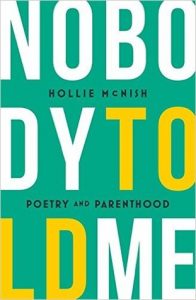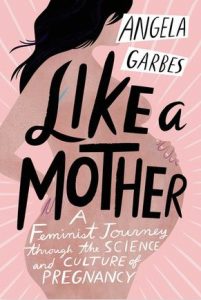How often do three titles coalesce into a relatively coherent expression of the experience of reading them? I was going to call this review “Revisiting Pregnancy Narratives After Three Years of Motherhood” because something made me delve back into this topic almost exactly three years after the birth of my son, but somehow Nobody Told Me, After Birth, and Like a Mother was just perfect. Even (especially?) in its semi-coherence.
I feel blessed to live in an age where such a wealth of literature (fiction and non-) is being produced to counter some of the crap that our culture has converged around as our vision of motherhood. There are precursors, yes, and I’ve written about some of my favorite pregnancy books for writers previously, but Nobody Told Me, After Birth, and Like a Mother spoke hard to my mother self, writer or not, and I wanted to share why.
Nobody Told Me
 I’ll admit that when my husband gave Nobody Told Me by Hollie McNish for Mother’s Day “because it was on your to-read list” I had absolutely no memory of having ever heard of this book. While people did tell me I’d experience “pregnancy brain,” no one told me (that I remember anyway) my ability to retain information would be permanently altered (or at least that’s my experience so far).
I’ll admit that when my husband gave Nobody Told Me by Hollie McNish for Mother’s Day “because it was on your to-read list” I had absolutely no memory of having ever heard of this book. While people did tell me I’d experience “pregnancy brain,” no one told me (that I remember anyway) my ability to retain information would be permanently altered (or at least that’s my experience so far).
There were so many thing no one told me (and which I cannot remember) that reading McNish’s contemporaneous journal of her pregnancy and first three years of motherhood made me feel wonderfully immersed in that world again. Her voice is gently honest, and whether she’s recounting the everyday indignities (like having no one offer you a seat on the bus when you’re ginormous) or sweetnesses (“When no one is watching, I feel amazing. Like that gigantic, ripe, juicy magic peach”) you’re endeared to her (and, if you’ve been pregnant, to your own memories both good and bad). She’s also deeply generous to the people around her—taking the necessary moments to look at why her grandmother tries to spare her the “embarrassment” of walking around her village pregnant and unwed or when McNish takes pity on her father who is helpless around her child and examines why his generation of men is that way and all the things they’re missing as a result.
I loved that she included her (basically unedited I think) poems in this text, even though I did not always love the poems, because they made me love even more this huge body of work I created while pregnant that I’ve been somewhat embarrassed by (both because I’ve been adding a derogatory “mommy poetry” label to it and because I was new to poetry so a lot of it really isn’t good).
Whether credit goes to me for finding this book (which will be issued in the US this November) or to my husband for having the memory to get it into my hands, I don’t care. I’m just glad I read it and that I read it right now.
Like a Mother
 How strange and wonderful it felt to find Like a Mother: A Feminist Journey through the Science and Culture of Pregnancy in a newsletter for a local bookstore because Angela Garbes is a local author and though our worlds have not overlapped, I feel like our experiences have. There was not as much revolutionary science as I hoped in this book (partially because I did get to read Penny Simkin and some others who are trying to give pregnant women actual information while I was pregnant), but I still loved the book and I learned a lot of things. Most importantly I learned to trust my own experience.
How strange and wonderful it felt to find Like a Mother: A Feminist Journey through the Science and Culture of Pregnancy in a newsletter for a local bookstore because Angela Garbes is a local author and though our worlds have not overlapped, I feel like our experiences have. There was not as much revolutionary science as I hoped in this book (partially because I did get to read Penny Simkin and some others who are trying to give pregnant women actual information while I was pregnant), but I still loved the book and I learned a lot of things. Most importantly I learned to trust my own experience.
Garbes is witty and straightforward as she recounts the kinds of stories I have only ever shared with closely trusted family members (maybe I should be better about breaking the “nobody told me” cycle but I might let Garbes do it for me). From breastfeeding to sex to the importance of being cared for during pregnancy and birth, this book touched so many memories (and nerves) for me.
Through the gory (fascinating) details of the function of the placenta to the beauty of the ways that life and death coexist in a woman’s body as she carries with her forever the cells of motherhood, I felt grief while reading this book and I felt empowered. Most of all I felt normal, a sensation that is far too uncommon in these somewhat lonely days of parenting.
After Birth
 Though it was Garbes who wrote about how parents “lean into the utter obliteration of their previous selves,” it’s Elisa Albert who dives all the way into exploring that experience in her novel, After Birth. The thing I love most about this book (among many) is how deeply angry new mother Ari is. It’s something I’ve seen lambasted in reviews, which I understand because it’s directly in opposition to the sweet, loving acceptance we all want to think our mothers immediately felt when we were born, but it’s fucking real. Especially in a world where too many of us are too alone in this event that changes our lives completely.
Though it was Garbes who wrote about how parents “lean into the utter obliteration of their previous selves,” it’s Elisa Albert who dives all the way into exploring that experience in her novel, After Birth. The thing I love most about this book (among many) is how deeply angry new mother Ari is. It’s something I’ve seen lambasted in reviews, which I understand because it’s directly in opposition to the sweet, loving acceptance we all want to think our mothers immediately felt when we were born, but it’s fucking real. Especially in a world where too many of us are too alone in this event that changes our lives completely.
Ari grapples with a birth that did not go how she wanted it to (this is a euphemism because no one except other mothers really wants to even hear about shitty birth experiences), a body that’s irrevocably changed (torn apart), and a community that either does not or cannot meet her needs (in many cases because they aren’t even there). In short, it’s an all-too-familiar tale, but one that many women suffer in silence. I loved how angry Ari was because anger is the last thing we want moms to express and yet it’s a very real emotion (and one that doesn’t get better if we don’t feel entitled to even feel it).
After Birth can be as uncomfortable to read as the title is to imagine. It’s also funny and dark and real and I want all of my friends to read it and then I want us to say, collectively, all the taboo things about parenting REALLY FUCKING LOUD.
If you want to get real about pregnancy and early parenting, pick up a copy of Nobody Told Me, Like a Mother, and After Birth from Bookshop.org. Your purchase keeps indie booksellers in business and I receive a commission.
Isla, thank you. I love having books to recommend to new parents–especially books that bust through all the guilting-and-shaming that makes new parents feel like if they’re not perfect, they’re failing.